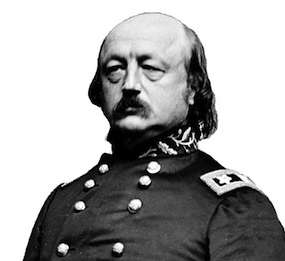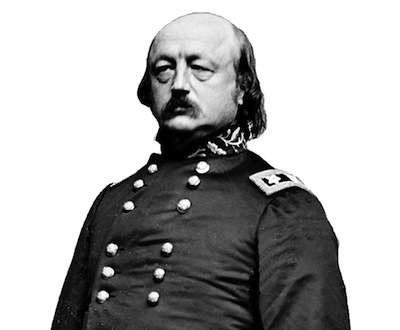[jpshare]Benjamin Butler was good at many things, but he was best at making enemies. He would become a criminal lawyer, businessman, Army general and Massachusetts governor. When he died, he was worth $7 million. His detractors accused him of corruption, and they were probably right.
He was full of contradictions. He supported a law creating the 10-hour workday, but he opposed workers’ rights to strike for it. As a congressman he authored a civil rights bill and the Ku Klux Klan Act of 1871, which allowed the federal government to prosecute the Klan in the South. But as a delegate to the Democratic National Convention in 1860 he supported Jefferson Davis for president. He supported workers’ rights to a
Benjamin Butler was born on Nov. 5, 1818, in Deerfield, N.H., and at the age of nine received a scholarship to Phillips Exeter Academy. He lasted one term because he got into fights. A schoolmate described him as a ‘reckless, impetuous, headstrong, boy.’
He grew up to be a reckless, impetuous, headstrong man who liked to fight.
His father died when he was young, so his mother moved to Lowell, Mass., to run a boardinghouse. He went to Colby College in Waterville, Maine, though he wanted to go to West Point. After college he opened a criminal law practice in Lowell. He married a well-to-do stage actress from Lowell named Sarah Hildreth, and they had four children.
When the Civil War broke out, he was elected a brigadier general in the Massachusetts militia, which was called up to duty. He started out well, quickly securing Annapolis, the seat of Maryland’s government, for the Union. He won the Battle of Forts Hatteras and Clark in North Carolina. He marched on to New Orleans, where he was appointed military governor. He began to make enemies in earnest.
Order 28
Butler was already hated in the South because he was the first to treat slaves as contraband and refuse to return them to their owners. He did do some good in New Orleans while he was in charge. He brought order to the city and donated $1,000 of his own money to buy food for the starving inhabitants. He hired the poor to clean the streets and allowed businesses that transported food to operate. But he also seized the property of Louisianans who refused to pledge loyalty to the Union, which would end up in the hands of a Butler consortium. He censored newspapers and antagonized foreign consuls.
All that was nothing compared to Order 28 of May 15, 1862. It stated any woman who showed contempt for a U.S. soldier would be treated as a “woman of the town plying her avocation” – that is, a prostitute.
He actually had good reason for the order. Women were throwing buckets of their own urine on soldiers of the Union Army, and nothing could be done about it because they were considered respectable. The order ended the attacks on the soldiers without any arrests, but provoked outrage in the North, the South and overseas. Benjamin Butler would forever after be known as Beast Butler.
He was recalled from the post in December 1862. Several military misadventures later, he was ordered home. He resigned his commission.
Benjamin Butler was elected to the U.S. House of Representatives in 1866 and served five terms. He was elected governor of Massachusetts in 1882 and made an unsuccessful run for president in 1884. He died on Jan. 11, 1893 and was buried in Lowell, where his tombstone reads, “”the true touchstone of civil liberty is not that all men are equal but that every man has the right to be the equal of every other man – if he can.”

